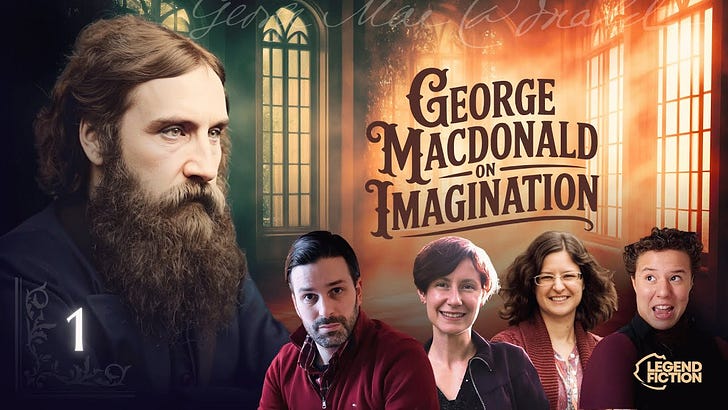The Surprising Power of Imagination (Before Tolkien): George MacDonald - Inspired the Inklings
The LegendFiction Mentors read and discuss 'The Imagination: Its Function and its Culture' - looking for the epic, the deep, and the fun.
What if your imagination is actually a way to hear God? In this episode, the mentors from the Legend Fiction community explore some deep ideas from George MacDonald, a writer who inspired authors like Tolkien and C.S. Lewis. They read from his essay 'The Imagination: Its Function and Its Culture,' and talk about how imagination isn’t just for making up stories—it might actually help us understand spiritual truths.
They discuss how thoughts can sometimes feel like they come from somewhere outside of us, and how the world around us helps us find ways to express what’s going on inside. They look at how we use stories, poems, and metaphors to give shape to our ideas and feelings—just like God used his imagination to shape the world, and us.
Whether you're a writer, an artist, or just someone who loves stories, this conversation will help you see your imagination in a whole new way. It’s a thoughtful and fun look at why imagination really matters—and how it might be more powerful than you think.
ABOUT THIS SERIES: “The Imagination: Its Function and its Culture” by George MacDonald
George MacDonald doesn’t just defend imagination—he crowns it as a sacred faculty, a spark of divine likeness in the human soul. Imagination is not childish indulgence or idle fantasy, but a generative force that breathes meaning into facts and forms unseen truth into beauty.
Imagination is the bridge between inner vision and outer reality. It births empathy, deepens science, and ignites awe. For MacDonald, even words themselves are crystallized acts of imagination—our attempt to give shape to feeling, thought, and mystery.
When imagination is stifled, the soul withers. A world without it becomes mechanical, heartless. The young should not have their wild vision tamed, but cultivated—through noble stories, sacred nature, and moral imagination. Ultimately, imagination is a way of seeing—as poets, prophets, and mythmakers do. When rightly nurtured, it leads us not away from truth, but toward the heart of it—and closer to God Himself.
Special Note: Jeremiah Stiles, a LegendFiction member, is working to get George MacDonald’s books back into print! Visit his site to join his waitlist for more news.
Key Takeaways
IMAGINATION AS DIVINE CONNECTION
George MacDonald argues that imagination isn’t just creativity—it’s a reflection of God’s own imagination.
Our thoughts might come from beyond us, arriving like gifts we’re meant to unwrap and share.
SUBCREATION & STORYTELLING
Tolkien’s idea of “subcreation” builds on MacDonald’s—writers create worlds in the image of God’s creation.
Stories aren’t just made up—they are how we make sense of deep truths inside us.
LANGUAGE AS A SPIRITUAL TOOL
Every word once carried poetic, powerful meaning—language is imagination at work.
Poetry and storytelling revive old words and help us experience the world with wonder.
WHY STORIES STILL MATTER
We need stories to clothe our thoughts in forms people can understand.
As our interior lives grow, we’ll always need new stories to keep up.
WRITERS HAVE A SACRED ROLE
Writers act as translators between the visible world and invisible truths.
Even when imagination is dismissed, it can remain a holy gift that brings truth to life.





This looks awesome. I’m looking forward to watching it. Thank you all!